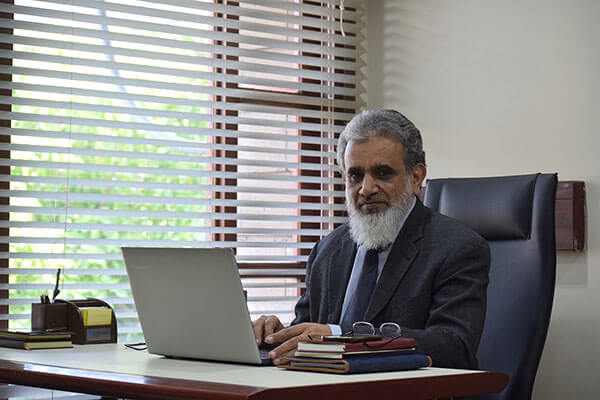
 I welcome you to one of the prime institutions imparting textile education and
I welcome you to one of the prime institutions imparting textile education and
professional training. I am fortunate to have a dedicated, hard-working, and efficient team of faculty and staff. They are the main players who continuously work with a passion for learning, imparting knowledge and skills, problem-solving, confidence-building, and dedication. The ongoing support of our alumni body and industry strengthens us to achieve our goals and stay at par with the modern world.
In the past four years, we have improved our curricula, relationship with the industry and academia, higher education commission, and community. As a result, we have noticed a significant growth in uptake of students and placement of our graduates in a diverse range of fields in textile and associated industry.
The efforts are on to establish a relationship with international institutions of good reputes including POLIMODA (Italy) School Of Chambre Syndicale De La Couture Parisienne (France) and a few Turkish Universities. The strength of the institute is a diverse background of students that helps them to learn from each other and will enable them to serve in all parts of Pakistan.
The importance of textile and related education in Pakistan can be judged from recent surveys, official data, and reports. An increase in the export of quality denim fabrics has been witnessed (16 % in terms of quantity and 15% in terms of value for the period July-Dec 2018-2019), since many leading global brands designated Pakistan as the prime source of quality denim fabrics. The high level of being undertaken by the denim industry has made its products demanded globally. The future is even brighter as well as challenging. Since most of the fabrics are exported to Bangladesh, Turkey, Sri Lanka, and Vietnam and they earn more by value addition efforts and underway to use our indigenous fabrics for our garment industry. Continuous brand development and marketing, as well as investments in lean and efficient manufacturing, are the need of the day in facing intense global competition. Another area of future interest is technical textiles where the global market generated US$ 234.71 billion in 2017 and is expected to reach $ 334.94 billion by 2025. Energy-saving, environmental and compliance issues need skilled manpower to address the challenges. On the other hand, the government of Pakistan is giving incentives to textile exporters that have shown an initial positive impact on exports. Another interesting observation that the export of cotton yarn and cloth was decreased with an increase in knitwear, bedwear, and readymade garments indicates that there is an emphasis on value addition. Pakistan is also attracting international investors in different fields of textiles. In addition to all the above-mentioned facts, there has been significant growth in Pakistan’s knitwear industry.
The whole scenario is indicative of the fact that there will be a very high demand for a technical workforce in the textile and related industry especially in value-added sectors like fashion, design, garment manufacturing, management, and marketing, etc. Pakistan’s export share to the world is 1.76% in all textiles while it is only 1.34% in apparel that shows, there is a huge space for growth.
We at TIP are ready to take this challenge of providing a technical workforce for the future growth of textile and related industries and eventually of Pakistan.
Dr. Abdul Jabbar
- The facts and data were taken from:
- Pakistan Textile journal
- Pakistan Bureau of Statistics
- TDAP
- Pakistan Economic Survey
